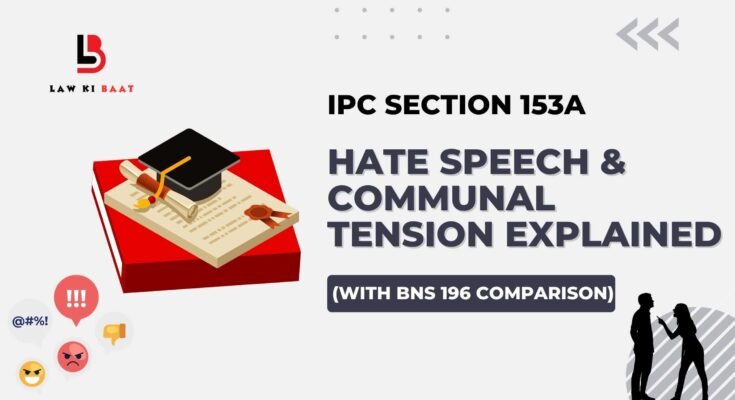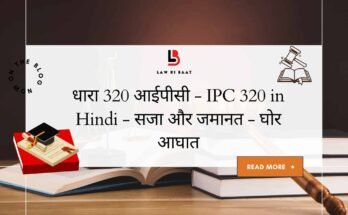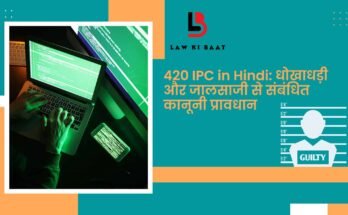In a country as diverse as India, where language, religion, and regional identities intertwine, maintaining communal harmony is crucial. To curb hate speech and prevent communal disharmony, the Indian Penal Code incorporated IPC 153A, which criminalizes acts that promote enmity between different groups. But with the introduction of the Bharatiya Nyaya Sanhita (BNS) in 2023, Section 196 of BNS aims to replace IPC Section 153A, continuing the commitment to protecting public order.
This blog explores what is IPC Section 153A, how it operates, the new hate speech law in Bharatiya Nyaya Sanhita, and the difference between IPC 153A and BNS 196. We also address common user questions like “can someone be arrested for hate speech in India?” and “does WhatsApp hate speech fall under IPC 153A?”
What is IPC Section 153A?
IPC Section 153A of the Indian Penal Code, 1860, penalizes any person who, by words (spoken or written), signs, visible representations, or otherwise, promotes enmity between different groups on the grounds of religion, race, place of birth, residence, language, etc., and acts prejudicial to the maintenance of harmony.
This law is essential in tackling the increasing threat of hate speech law in India, especially during communal or political tensions. The provision aims to criminalize actions that incite violence or promote enmity between different groups.
Offences Covered Under IPC 153A
Section 153A IPC explanation can be summarized in the following points:
- Promoting enmity between different groups based on religion, caste, etc.
- Acts prejudicial to harmony.
- Any activity that disturbs public tranquility.
- Deliberate or malicious intention to outrage religious feelings.
The offence is cognizable and non-bailable, meaning police can arrest the accused without a warrant, and bail is not a matter of right.
How Does IPC 153A Deal with Religious Hate Speech?
A key aspect of IPC 153A is addressing religious hate speech. It ensures that those who make inflammatory speeches or spread misinformation with the intent to insult religious sentiments are held accountable. The Indian Penal Code hate speech provision aligns with constitutional values while balancing freedom of expression vs hate speech.
Real-Life Examples of Hate Speech Cases in India
Several examples of hate speech cases in India highlight how courts interpret IPC Section 153A. In the case of Bilal Ahmed Kaloo vs State of Andhra Pradesh, the Supreme Court stressed the need for clear intention and actual enmity provocation.
Moreover, many public figures have faced legal action against content copying in India or hate-laden speeches—underscoring the importance of this law in maintaining public order and hate crimes prevention.
Is Hate Speech a Cognizable Offence in India?
Yes, hate speech is a cognizable offence in India under IPC 153A, allowing police officers to arrest without prior court permission. The law against inciting violence in India empowers law enforcement to act swiftly against potential threats to communal peace.
Section 153A and Freedom of Speech
Section 153A and freedom of speech often collide. While Article 19(1)(a) guarantees freedom of speech, it is subject to reasonable restrictions under Article 19(2) to ensure sovereignty, integrity, and public order. Courts have ruled that insulting religious beliefs without incitement to violence may not always amount to an offence, emphasizing the interpretation of hate speech by Indian courts.
Does WhatsApp Hate Speech Fall Under IPC 153A?
Yes, WhatsApp hate speech or offensive messages in any digital format can be prosecuted under IPC 153A, especially if they promote communal hatred or incite violence. With the increasing use of social media, Indian hate speech laws for online content have become a key area of focus for law enforcement.
What is the Punishment for Spreading Communal Hatred?
Under IPC 153A, the punishment can extend to:
- Imprisonment up to 3 years
- Fine
- Or both
In certain cases, if the offence is committed in a place of worship or religious gathering, the sentence may extend to 5 years with a fine. This serves as a deterrent against communal violence and criminal law violations.
Legal Remedies: How to File a Complaint Under Section 153A IPC?
If you witness hate speech or want to know how to file a complaint under Section 153A IPC, follow these steps:
- Collect evidence (recordings, screenshots, etc.).
- File an FIR at the nearest police station.
- You can also escalate the issue to cybercrime portals or human rights commissions.
These are effective ways for how to report communal tension legally and seek justice under the legal provisions against communal riots.
What is Section 196 of BNS?
With the Bharatiya Nyaya Sanhita replacing the colonial-era IPC, Section 196 BNS 2023 now deals with similar offences previously covered under IPC 153A. The aim is to modernize, clarify, and simplify the new hate speech law in Bharatiya Nyaya Sanhita, while retaining the core objective of discouraging hate and maintaining peace.
Difference Between IPC 153A and BNS 196
While IPC 153A criminalized hate speech, BNS 196 provides a more refined and tech-relevant framework. Here’s a quick comparison:
| Feature | IPC 153A | BNS Section 196 |
| Enacted in | 1860 | 2023 |
| Basis | Promoting enmity between groups | Same, but with digital context |
| Medium | Oral, written, signs | Includes digital media |
| Max punishment | Up to 5 years | Similar, with possible changes |
This comparative analysis of IPC and BNS reflects India’s evolving legal response to hate speech.
FIR under BNS 196 Process
The FIR under BNS 196 process is similar to that of IPC 153A:
- Approach the police with details of the hate speech.
- Provide supporting documents or digital evidence.
- FIR is registered and investigation begins immediately.
In sensitive cases, the police may seek prior sanction under Section 196 of CrPC if public servants are involved.
Political Hate Speech and the Law
In a charged political climate, is political hate speech punishable in India? Absolutely. Whether by a politician or influencer, Section 153A IPC and BNS 196 apply uniformly. Public speeches aimed at inciting hatred, especially around elections, can lead to criminal prosecution under hate speech law in India.
Does Criticism of Religion Fall Under Hate Speech Law?
One of the frequently asked questions is: does criticism of religion fall under hate speech law? The answer lies in intention and impact. Constructive criticism without incitement to violence or enmity is protected. However, malicious intent or attempts to provoke unrest can be punishable under IPC 153A.
How Does Indian Law Protect Public Order?
To safeguard public order, the government enforces preventive measures under BNS, which include:
- Blocking websites and content under IT Act
- Monitoring social media for hate speech law violations
- Quick action through police action under IPC 153A
Sedition vs Hate Speech in India: Are They Different?
Yes, sedition vs hate speech in India are distinct legal categories. While sedition (Section 124A) concerns inciting violence against the state, IPC Section 153A relates to inciting violence among communities or groups.
Conclusion
In today’s era of hyper-connectivity and political polarization, laws like IPC 153A and BNS Section 196 remain vital tools in curbing hate speech and safeguarding India’s unity in diversity. These provisions not only criminalize inflammatory behavior but also ensure that freedom of speech is not misused to provoke communal violence or unrest.
As India transitions to the new Bharatiya Nyaya Sanhita, using reliable IPC to BNS converter tools or tables is crucial to understanding updated sections like how IPC 153A corresponds to BNS 196. This ensures better awareness, especially for legal professionals, journalists, and civil society groups tracking hate speech cases.
For well-researched insights on hate speech law in India, step-by-step guides for filing a complaint under IPC 153A, and understanding the FIR under BNS 196 process, explore Law Ki Baat—a trusted legal blog platform offering clarity on complex legal issues in a simple, reader-friendly manner.




